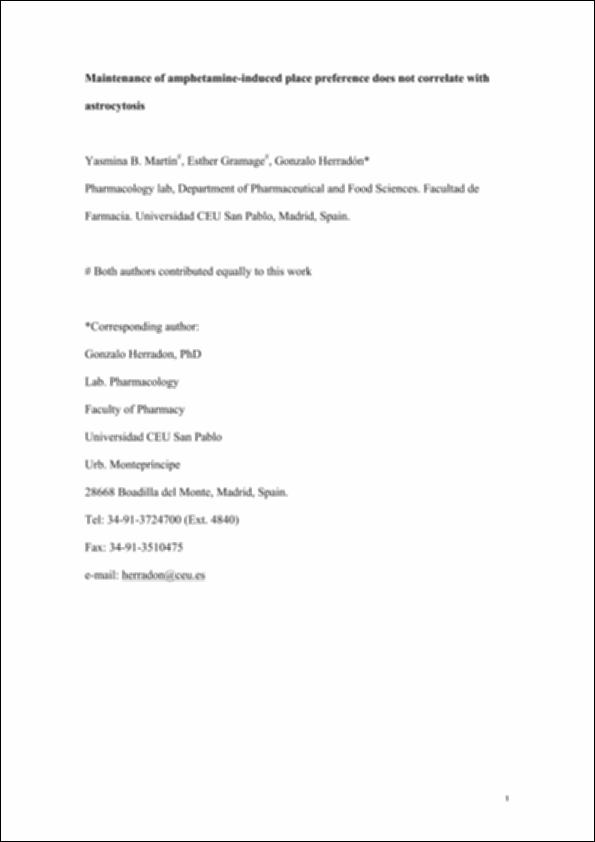Please use this identifier to cite or link to this item:
http://hdl.handle.net/10637/7109Maintenance of amphetamine-induced place preference does not correlate with astrocytosis.
| Title: | Maintenance of amphetamine-induced place preference does not correlate with astrocytosis. |
| Authors : | Martín, Yasmina B. Herradón Gil-Gallardo, Gonzalo Gramage Caro, Esther |
| Keywords: | Anfetaminas; Efectos secundarios; Pleiotrophin |
| Abstract: | Astrocytosis, a process in which astrocytes undergo proliferation and enhancement of glial fibrillary acidic protein (GFAP) expression, has been suggested to play important roles in the maintenance of dependence to amphetamine and its derivatives. It was previously shown that mice with genetic deletion of pleiotrophin (PTN), a neurotrophic factor upregulated in different brain areas after administration of amphetamine, show a longer lasting amphetamine-induced conditioned place preference (CPP) when compared to wild type mice. In this work, we aimed to pursue the possibility of a different astrocytic response induced by amphetamine in PTN-/- and PTN+/+ mice, which could underlie the higher vulnerability of PTN-/- mice to maintain amphetamine CPP. In confirmation of previous studies, we found that PTN-/- mice significantly maintained amphetamine (3 mg/kg)-induced CPP 5 days after the last drug administration compared to PTN+/+ mice. Interestingly, the number of astrocytes in nucleus accumbens (NAcc), cingulate cortex (CG) and caudate putamen (CPu) did not differ between mice that maintained and did not maintain amphetamine-induced CPP independently of the genotype considered. However, we found that PTN-/- mice showed significantly decreased numbers of astrocytes in CG and CPu compared to PTN+/+ mice independently of whether they maintained amphetamine-induced CPP 5 days after the last drug administration or not. The data demonstrate that maintenance of amphetamine-induced CPP depends on the endogenous expression of PTN. The data tend to discard a correlation between activated astrocytes and maintenance of amphetamine conditioning effects and suggest PTN as a potential modulator of activation of astrocytes after amphetamine treatment. |
| Description: | En: European Journal of Pharmacology. ISSN 0014-2999. v. 699, n. 1-3 (2013), p. 258-263 |
| URI: | http://hdl.handle.net/10637/7109 |
| Rights : | http://creativecommons.org/licenses/by-nc-nd/4.0/deed.es |
| Issue Date: | 26-Mar-2013 |
| Center : | Universidad San Pablo-CEU |
| Appears in Collections: | Facultad de Farmacia |
Items in DSpace are protected by copyright, with all rights reserved, unless otherwise indicated.


